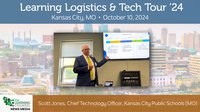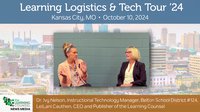Education Design Lab (the Lab), a national nonprofit and leader in the design, implementation, and scaling of new learning models for higher education and the future of work, today named five key innovators from colleges and universities as Badging Fellows.
Selected through a competitive RFP process that attracted applications from government agencies, educational institutions and nonprofit organizations, each of the Badging Fellows will participate in a national professional development workshop at the EDUCAUSE Annual Conference and then work with designated teams to pilot a new micro-credentialing initiative on their campus. The Lab selected innovators who have recommended important ways to scale and enhance the Lab's 21st Century Skills Badges to meet the needs of historically underrepresented learners.
The project was made possible by a grant from the deLaski Family Foundation and pro bono support from the Education Design Lab. Successful proposals ranged from St. Mary's University's pilot project exploring badging as a way to assess empathy for working with human trafficking survivors, to one at Minnesota State IT Center of Excellence that will pilot the use of micro-credentials statewide to reflect real-world experiences of working in IT. The Badging Fellows are listed below, along with a short description of their projects:
- Bridgette Cram, Florida International University- "Changing the Narrative: A Focus on Self-Regulated Learning" will enhance instruction around "Initiative" and "Resilience" through a curriculum centered on assisting students to develop and use the skills to enhance personal and professional success and explore the potential use of augmented and virtual reality.
- Rolando Sanchez, Northwest Vista College- "#TeeUpTheToolkit" will focus on scaling their initial badging program by creating a more seamless digital learning experience with innovative design software (CidiLabs) and Canvas Public Catalog and crafting robust rubrics to strengthen and clarify the standards behind 21st century skill badges.
- Kathryn Aultman, St. Mary's University- "Career Management Badging" will enhance the Lab's Empathy badge by focusing on enhanced curriculum and bundling it with "Networking" and "Time Management" badges to create a suite of marketable badges for an overlooked and vulnerable population--human trafficking survivors.
- Lalitha Subramanian, University of Washington Continuum College- "Professional Expertise & 21st Century Skills" will focus on their nontraditional learners and build bridges between the academy and the workplace by designing an innovative process to identify and assess 'human skills' in conjunction with experts and employers—targeting their nontraditional learners between theory and practice, the academy and the workplace.
- Wilson Garland, Minnesota State IT Center of Excellence- "Project ELEVATE" will take career readiness, 21st century skills and badging to the next level for the entire state's Information Technology and Computer Science Program by tailoring the overall badge experience to reflect real-world IT workplaces and scenarios.
"At a time when there are more than 190,000 digital badging programs, according to a new Credential Engine report, micro-credentialing is fast gaining acceptance as education providers work to translate hard-to-measure skills into industry-recognized credentials," said Don Fraser, director of micro-credentialing at Education Design Lab. "These innovators have agreed to work from the Lab's 21st century skill framework to move toward consistent competency definitions for employers."
"I am thrilled to be designated as a Badging Fellow. As the Minnesota State IT Center of Excellence, our mission is to engage employers, educators, and students to develop a more robust IT workforce in Minnesota," said Wilson Garland, Executive Director of the Minnesota State IT Center of Excellence. "The IT Center worked with faculty across the Minnesota State college and university system to pilot three Modules in early 2019, underpinned by the Education Design Lab 21st Century Skills Badges. Being a Fellow and working directly with Education Design Lab will add rocket fuel to our work to offer valuable skills and micro-credentials to IT, computer science and data science students across the state."
Currently celebrating its five-year anniversary, Education Design Lab has worked successfully with more than 100 colleges and universities, from HBCUs and religiously-affiliated institutions to public universities and community colleges. Since releasing the badging toolkit 18 months ago, more than 1100 institutions of higher education, nonprofits and K-12 school districts have signed on to use or learn about the badges.
The EDUCAUSE Annual Conference will take place Oct 15-17 and will welcome more than 4,000 experts in higher education technology and practice to the McCormick Place West building in Chicago.
Visit the EDUCAUSE website to register for the pre-conference workshop on badging "Jump-Starting Your Institution's Badging Initiative". For more information on the Badging Fellows initiative, visit EdDesignLab.org/BadgingFellows or contact badgingfellows@eddesignlab.org.
About Education Design Lab: Education Design Lab is a national nonprofit that designs, tests, and implements unique higher education models and credentials that address the rapidly changing economy and emerging technology opportunities. The Lab demonstrates where technology, rigor and design can improve opportunity for historically underserved learners to maximize their potential in the higher education system.
Education Design Lab works across disciplines and alongside schools, employers, entrepreneurs, government, foundations, nonprofits and innovators. The organization has significant experience managing national and local learning cohorts, working with organizations such as Lumina Foundation, the Michael and Susan Dell Foundation, the United Negro College Fund, Walmart, Credly, American Council on Education and the ECMC Foundation. Learn more: www.eddesignlab.org.











